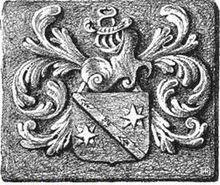Loading AI tools
Sephardic Jewish family claiming descent from David From Wikipedia, the free encyclopedia
The Abravanel family (Hebrew: אַבְּרַבַנְאֵל ʾAbravanʾēl or אַבַּרבְּנְאֵל ʾAbarbənʾēl), also spelled as Abarbanel, Abrabanel, Avravanel, Barbernell, or Barbanel – literally meaning Ab ("father") rabban ("priest") el ("of God") – is one of the oldest and most distinguished Jewish families. It first achieved prominence on the Iberian Peninsula during the Middle Ages. Its members claim to trace their origin to the biblical King David. Members of this family lived in Seville, Córdoba (Spanish province), Castile-Leon, and Calatayud. Seville is where its most prominent representative, Don Judah Abravanel, once dwelt.

Don Judah Abravanel was treasurer and tax collector under Sancho IV of Castile (1284–95) and Ferdinand IV of Castile (1295–1312). In 1310 he and other Jews guaranteed the loans made to the crown of Castile to finance the siege of Algeciras. He probably was almoxarife ("collector of revenues") of Castile. Don Judah Abravanel and his family later fled to Lisbon, Portugal, where they reverted to Judaism and filled important governmental posts.[1] His son, Judah (died 1471), was in the financial service of the infante Ferdinand of Portugal, who by his will (1437) ordered the repayment to him of the vast sum of 506,000 reis blancs. Later, he was apparently in the service of the Duke of Braganza. His export business also brought him into trade relations with Flanders. He was the father of Don Isaac Abrabanel and grandfather of Judah Leon Abravanel and Samuel Abravanel.
Another eminent member of the family was Samuel of Seville, of whom Menahem ben Aaron ibn Zerah wrote that he was "intelligent, loved wise men, befriended them, was good to them and was eager to study whenever the stress of time permitted". He had great influence at the court of Castile. In 1388, he served as royal treasurer in Andalusia. During the anti-Jewish riots of 1391 he was forcibly converted to Christianity under the name of Juan Sánchez (de Sevilla) and was appointed comptroller in Castile. It is thought that a passage in a poem in the Cancionero de Baena, attributed to Alfonso Álvarez de Villasandino, refers to him.
Samuel Abravanel, Don Judah Abravanel's grandson, settled in Valencia, and Samuel's son, Judah (and perhaps Don Judah himself), left for Portugal. Isaac, the son of Judah, returned to Castile, where he lived until the time of the great expulsion of the Jews from Spain in 1492. Then, with his three sons, Judah, Joseph, and Samuel, Isaac went to Italy. Their descendants, as well as other members of the family who arrived later from the Iberian Peninsula, have lived in the Netherlands, England, Ireland, Germany, Turkey, Greece and American continent since the sixteenth century.
The high relative status of the family among the people of Iberia is indicated by a Ladino saying in Thessaloniki: Ya basta mi nombre ke es Abravanel, meaning "My name is enough, and my name is Abravanel."[2]
Don Isaac Abravanel wrote that his forebears were descended from King David, but this has been challenged on the grounds of lack of sources.[citation needed]
Several of the more prominent members of this family include:
Seamless Wikipedia browsing. On steroids.
Every time you click a link to Wikipedia, Wiktionary or Wikiquote in your browser's search results, it will show the modern Wikiwand interface.
Wikiwand extension is a five stars, simple, with minimum permission required to keep your browsing private, safe and transparent.